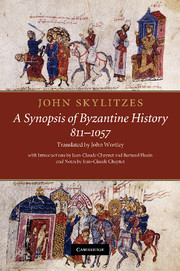Book contents
- Frontmatter
- Contents
- The English translator’s Preface
- Introduction
- Re-writing history: John Skylitzes’ Synopsis historion
- Foreword
- Chapter 1 Michael I Rangabe, the Kouropalates [811–813]
- Chapter 2 Leo V the Armenian [813–820]
- Chapter 3 Michael II the Stammerer [820–829]
- Chapter 4 Theophilos [829–842]
- Chapter 5 Michael III, the son of Theophilos [842–867], and his mother Theodora [842–862]
- Chapter 6 Basil I Kephalas, the Macedonian [867–886]
- Chapter 7 Leo VI the Philosopher (the Wise) [886–912]
- Chapter 8 Alexander [912–913]
- Chapter 9 Constantine VII, Porphyrogennetos [913–959]
- Chapter 10 Romanos I Lekapenos [919–944]
- Chapter 11 Constantine VII [944–959]
- Chapter 12 Romanos II the Younger [959–963]
- Chapter 13 Basil II Bulgaroktonos and Constantine VIII [976–1025]
- Chapter 14 Nikephoros II Phokas [963–969]
- Chapter 15 John I Tzimiskes [969–976]
- Chapter 16 Basil II and Constantine VIII bis [976–1025]
- Chapter 17 Constantine VIII [1025–1028]
- Chapter 18 Romanos III Argyros [1028–1034]
- Chapter 19 Michael IV the Paphlagonian [1034–1041]
- Chapter 20 Michael V Kalaphates [1041–1042]
- Chapter 21 Constantine IX Monomachos [1042–1055]
- Chapter 22 Theodora [1055–1056]
- Chapter 23 Michael VI the Elder/Stratiotikos [1056–1057]
- Glossary
- Bibliography
- Index
Chapter 17 - Constantine VIII [1025–1028]
Published online by Cambridge University Press: 05 July 2014
- Frontmatter
- Contents
- The English translator’s Preface
- Introduction
- Re-writing history: John Skylitzes’ Synopsis historion
- Foreword
- Chapter 1 Michael I Rangabe, the Kouropalates [811–813]
- Chapter 2 Leo V the Armenian [813–820]
- Chapter 3 Michael II the Stammerer [820–829]
- Chapter 4 Theophilos [829–842]
- Chapter 5 Michael III, the son of Theophilos [842–867], and his mother Theodora [842–862]
- Chapter 6 Basil I Kephalas, the Macedonian [867–886]
- Chapter 7 Leo VI the Philosopher (the Wise) [886–912]
- Chapter 8 Alexander [912–913]
- Chapter 9 Constantine VII, Porphyrogennetos [913–959]
- Chapter 10 Romanos I Lekapenos [919–944]
- Chapter 11 Constantine VII [944–959]
- Chapter 12 Romanos II the Younger [959–963]
- Chapter 13 Basil II Bulgaroktonos and Constantine VIII [976–1025]
- Chapter 14 Nikephoros II Phokas [963–969]
- Chapter 15 John I Tzimiskes [969–976]
- Chapter 16 Basil II and Constantine VIII bis [976–1025]
- Chapter 17 Constantine VIII [1025–1028]
- Chapter 18 Romanos III Argyros [1028–1034]
- Chapter 19 Michael IV the Paphlagonian [1034–1041]
- Chapter 20 Michael V Kalaphates [1041–1042]
- Chapter 21 Constantine IX Monomachos [1042–1055]
- Chapter 22 Theodora [1055–1056]
- Chapter 23 Michael VI the Elder/Stratiotikos [1056–1057]
- Glossary
- Bibliography
- Index
Summary
Although Constantine now assumed total authority and the power to do whatever he wished, his delight was in perverse behaviour and he was the cause of many ills for the community. He neither accomplished nor planned to accomplish any of the things he ought to have done but rather entertained himself with horse races, actors and comedy shows, passing his nights playing silly games. He did not appoint those who had demonstrated their worth by deed or word to civil and military positions, but wine-sodden, servile eunuchs, bloated with every kind of disgusting abomination. These he promoted to the most conspicuous and high offices, cursorily passing over those distinguished by birth, virtue and experience. He promoted Nicholas, his first chamberlain, to be domestic of the scholai and parakoimomenos; Nikephoros, the second one, to be protovestiarios, Symeon, the third, he made droungarios of the watch, and he gave them all the title of proedros. Eustratios, the most junior of the chamberlains, was made grand hetaireiarch. A eunuch named Spondyles became duke of Antioch, Niketas of Pisidia duke of Iberia, both of them notoriously evil men. They so disturbed and confused everything that they very nearly overturned the state, [371] the very state which had been so well ruled since the reign of Romanos [II], the father of the two emperors, by Nikephoros [II], John [I] and Basil [II] as they succeeded each other on the throne and rendered [the empire] a terror to the neighbouring peoples. And it was not only that he was undiscriminating in his appointment of officers, promoting whoever came to hand; he also persisted in oppressing the worthier and more experienced [candidates] and schemed against the distinguished [citizens]. He blinded the patrician Constantine too, the son of the magister Michael Bourtzes, for having harmed him before he became emperor by advising the emperor Basil of his unruly behaviour; and he eliminated not a few other good men as the narrative will explain in due course.
- Type
- Chapter
- Information
- John Skylitzes: A Synopsis of Byzantine History, 811–1057Translation and Notes, pp. 349 - 353Publisher: Cambridge University PressPrint publication year: 2010

